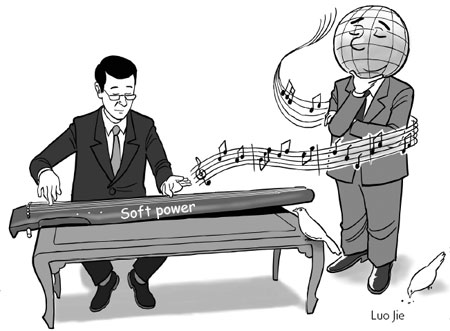
|
OPINION> Commentary
 |
|
China to don several hats on global stage
(China Daily)
Updated: 2009-03-26 07:47 Joseph Nye, professor of the Harvard Kennedy School of Government, is the creator of the theory of "soft power". He was interviewed by masters degree student Ying Carol Yu recently. Nye gives his thoughts on issues including China's Soft Power, Sino-US Relations and China's Foreign Policies. Following is first part of the interview: Soft Power Implications Q: In what areas do you think China can further improve its soft power? Do you think one day China's soft power might catch up with that of the US? A: I think in the long term, China's soft power will definitely be increased, as long as China continues to liberalize and open up among other reforms as well. If China becomes more prosperous and democratic, that will increase Chinese soft power. I would expect that to be the case. American soft power rests also on culture, values and foreign policies. What's interesting is that in the Bush administration, American policies were not seen as legitimate in many parts of the world, and this undercut American soft power. But American culture remained attractive. So when the Chicago Counsel on Global Affairs did a study of soft power in Asia, which they published last year, it still showed American soft power being higher than that of China or Japan or any other country. We would have to imagine a poll like that 10 years from now. If Chinese values become more open, the country continues to succeed, and the policies of China are seen as legitimate in the eyes of others, I would expect Chinese soft power to greatly increase. Whether Chinese soft power catches up and equals that of the US' or not will also depend on what is happening in the US on those same three dimensions.(cultures, values and policies) But I would tend to be optimistic of an increase in Chinese soft power. Q: In China, even though soft power is a relatively new concept, it has gained a lot of attention and has entered China's official language. Could you elaborate on the importance of soft power to China? A: China has a lot to gain from soft power. China's economic and military power are clearly rising, and in a period when you have a rising power, it often creates fear in neighboring countries, and that often leads other countries to join together to resist the rising country. But if the rising country also has soft power, and it is able to make itself attractive, it reduces the amount of fear the other countries have, and that makes it less likely that the other countries will try to balance China's power. So I think it is very wise to try to increase China's soft power because it would be a way to make China's rise of economic and military power more acceptable to other countries.
 Q: In addition to pioneering the theory of soft power, you also created the concept of "Smart Power". How do you think the use of smart power is going to change US foreign policy? How can China better harness smart power in asserting influence in international affairs? A: The most effective leaders are actually those who combine hard and soft power skills in proportions that vary with different situations. I think if you are able to combine both soft power and hard power effectively, you get smart power. Hillary Clinton vowed to restore American leadership through a smart power mix of diplomacy and defense as she appeared at a Senate hearing for confirmation as the US Secretary of State in January this year. Secretary Clinton talked about smart power as using all the tools in our foreign policy toolbox. Regarding the changes in American foreign policy using smart power, I think Secretary Clinton and President Obama have both said they want to place a much higher emphasis on diplomacy, to invest more in diplomatic resources, to do more with AID (US Agency for International Development), and to do more public diplomacy. These are some of the things that I think you will see more of under this administration. So I think when China develops its strategies, it is wise to try to combine soft power with hard power - the ability to attract and persuade, as well as the ability to use economic and military might. Q: How can China better combine soft power with hard power in asserting influence in international affairs? A: Other countries look at China's increase in military expenditure, which was about 18 percent last year, and they become anxious as to what China intends to do with this. But as China does more United Nations peacekeeping, as it tries to use more soft power approaches to the Taiwan issue, as it works with multilateral institutions such as the ASEAN Regional Forum - these are things that make Chinese military power less threatening. In other words, there are questions of capabilities and intentions. When people are uncertain about intentions, they become alarmed about increased capabilities, but to the extent that the intentions seem to be peaceful, the capabilities become somewhat less alarming. (China Daily 03/26/2009 page9) |